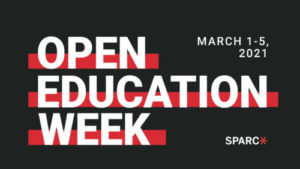Open Education Week (March 1-5, 2021, #OEWeek) is a time when educators around the world come together to learn and share practices around Open Educational Resources (OER) and Open Pedagogy. While there are a host of excellent webinars and events to tune into this week, let’s also celebrate our local faculty who are creating openly licensed resources, tailoring existing OER to better fit the needs of their students, and creating courses with fewer barriers to learning. Integrating OER into a course takes a lot of work, oftentimes uncompensated. But the result is well worth it. Students can access their course materials for free, from the first day of class. Ideally, the materials have been chosen and tailored to better align with the needs of the class, and they can be adapted easily if something isn’t working.
OER Projects Underway
UI Libraries supports faculty and graduate students working on OER projects through our OpenHawks grants program. There are currently 27 UI grant teams who are working on or have recently completed OER projects as part of this three-year pilot. You can read more about these projects at the links to our 2019 and 2020 announcements. Completed OpenHawks projects can be found in Iowa Research Online, as well as OER Commons, Open Textbook Library, and wherever else you go to find OER. The projects below are complete and ready to use.
- Illana-Mahiques, Emilia; and Alejandro Pérez Belda. OER: Curso de Escritura En Español. University of Iowa, 2020.
Description: The materials in this project are specifically designed for a third-year Spanish Writing course, offering guidance to instructors on how to develop each of the four modules that constitute the course: Description, narration, argumentation, and exposition.
- Myers, Brandon D. Guided Inquiry Activities for Programming Language Concepts. University of Iowa, 2020.
Description: Guided Inquiry Activities for Programming Language Concepts is a collection of activities intended to support the use of POGIL—a research-based instruction strategy comprising peer learning, development of process skills, and activities that are designed around the constructivist theory of learning cycles (pogil.org)—in intermediate-level undergraduate computer science courses on functional programming and the implementation of programming languages.
- Neal, Ted; Dunn, Rachel; Haley, Jenny; McDonald, Ella; Smith, Ben. Elementary Earth and Space Science Methods. Iowa City: University of Iowa, 2020.
Description: This book is intended for use by future teachers, written from the perspective of students who have taken Science Methods II. The student authors gathered and created resources to help prospective elementary science teachers better understand science and feel confident in their abilities as future teachers.
- Pizzimenti, Marc A.; Brenneman, Anthony; Gorney, Carol; Hickman, James; Bernat, Carrie. Physical Examination: Cardiovascular System. Iowa City: University of Iowa, 2020.
Description: At our institution, teaching basic physical examination (PE) skills capitalizes on the use of electronic resources and Standardized Patients (SP) with advanced training who are better able to assist students in developing their skills. This online module uses interactive methods, video, and concept applications to prepare learners for practice/review of the necessary components to develop a PE skill set.
- Wingate, Christine. American English Sounds. Iowa City, Iowa: University of Iowa, 2018-2021.
Description: American English Sounds is a web resource that allows English as a Second Language (ESL) students to practice perceiving and producing the sounds of American English in order to improve their pronunciation.
- Yoon, Sang-Seok; and Joung-A Park. Beginning Korean. Activity Book 1. Iowa City, Iowa: University of Iowa, 2020.
Description: The Korean Activity Book 1 is designed to provide various useful materials for practicing Korean. This book is ideal for learners at the Novice Low to Novice High levels who want to practice writing and pronouncing hangeul, communicate in Korean by creating sentences using basic grammar and vocabulary, and understand and create simple conversations that are useful in everyday conversations.
More about OpenHawks
We have just released our third Call for Proposals for additional OpenHawks grant funding. If you’re interested in applying or finding out more, I would encourage you to visit the OpenHawks website to learn about the different award categories and types of OER projects you might consider. You will also find more information about the application, including the rubrics we use to evaluate proposals, general information about OER, and links to upcoming informational sessions.
Applications are due on April 30, 2021 so get yours in soon!
Iowa Colleges and Universities Group on OER Commons
Finally, I’m pleased to announce the new Iowa Colleges and Universities Group on OER Commons. OER in these collections have been adopted, created, or recommended by faculty in the state of Iowa. The purpose of this group is to share OER that have been adopted in the state and to make it easier for faculty to locate what they need. You will be able to find many of the completed OpenHawks projects in the group, as well.
If you have any questions about OER, please contact me at mahrya-burnett@uiowa.edu.
